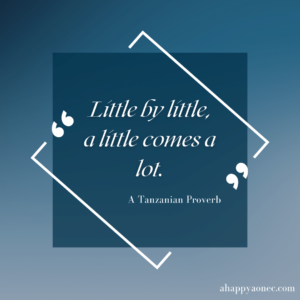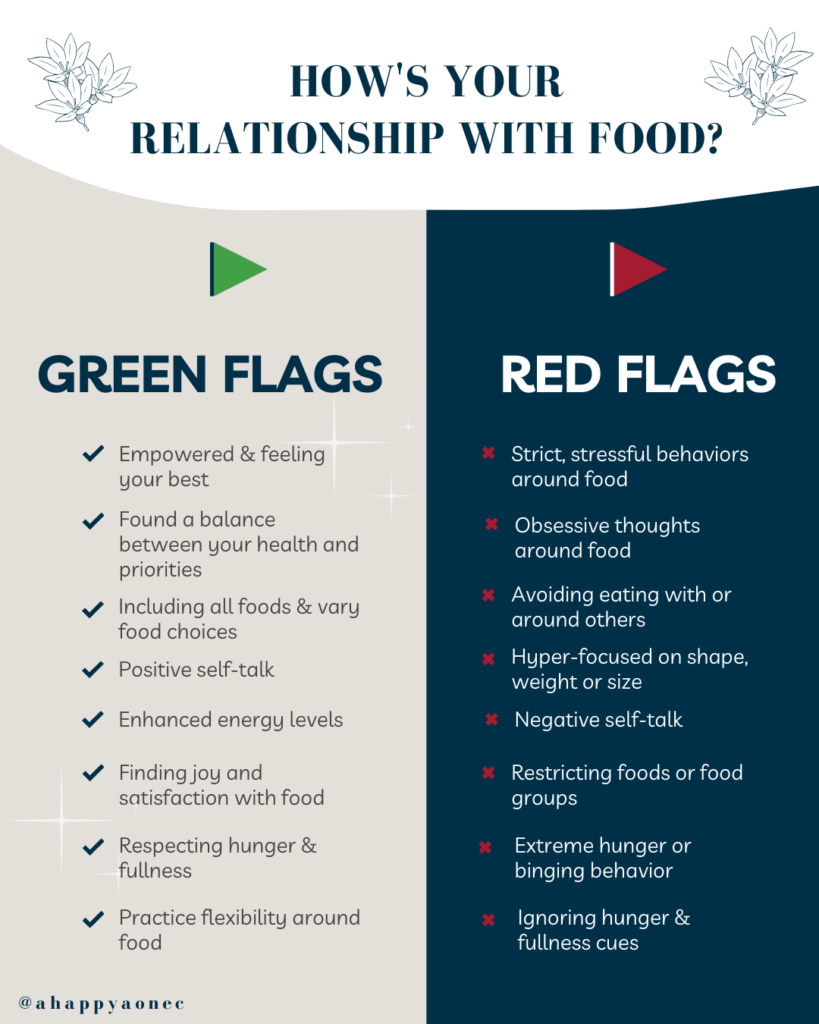It’s not about what you eat or don’t eat, it’s about how you eat it. There are two fundamental pillars to understand the how behind eating for prediabetes and blood sugar balance. The first and most important pillar is mindset. Don’t get me wrong, food and lifestyle play a critical role in prediabetes reversal. But if your plan is to permanently reverse prediabetes, then the key lies in mindset.
After receiving a new prediabetes diagnosis, the next best step to regain control is to audit your mindset around food and health. The mindset you approach your health with is more important than a long list of unachievable health goals. Without a mindset check, the food behaviors you plan to implement are not guaranteed to last. Pre-diabetes reversal is a life long project that cannot be accomplished permanently with a simple fix. It requires a long term solution, which makes it ever so important to consider how to make it as realistic and enjoyable to you and your life as possible. It might be hard to think about how you can ever find joy in eating again, but there is hope. You CAN still enjoy the foods you’ve always loved with confidence.

You may feel the pressure from your family or a Google search to change every bit of your life. The nutrition and fitness industry loves to encourage hustle culture, which often lead to health burn out. I invite you to put hustle culture aside and explore the possibility that achieving your healthiest self is closer than it may appear. It just takes some mindset adjustment .
Why does mindset matter so much?
Our ability to remain consistent with our health goal is deeply rooted in our mental health. There are many things that can interfere with our mental state, including prediabetes stigma, thoughts and behaviors we developed about ourself, anxiety and depression, etc. Therefore, I HIGHLY recommend that you take advantage of on-campus mental health resources surrounding you and seek out a licensed counselor to help you navigate your thoughts. This article aims to bust the myths around negative mindsets related to nutrition and supports a productive, sustainable way of thinking around food and health.

Reject the all-or-nothing mentality
When people become aware that prediabetes is reversible, the all-or-nothing mentality becomes appealing — especially to people prone to perfectionism. You might feel a sudden burst of motivation to transform your life and do everything right. You’ll probably be successful at first but you’ll quickly learn that you simply cannot keep up with it all. The expectations you set for yourself become unrealistic and unsustainable. You eventually burnout, quit, and experience feelings of failure and self-blame. These feelings become internalized rapidly snowballing into a decrease in self-worth and increasing your risk of emotional eating. What began as harmless health overachievements harmed your mental health, self-worth, and relationship with food.
To prevent health burnout, open your mind to the idea that small changes can make a difference. I encourage you to find one SINGLE nutrition practice that sounds realistic to you, without leaving you overwhelmed. This might be drinking an extra glass of water, walking 10-minutes per day, or adding one non-starchy vegetable to you meals. Whatever you choose, little changes are better than no changes. Health is not a win or lose situation. It’s the small things that add up to produce transformative results in the long run.
I want to make it crystal clear that no one is expecting you to drop everything and suddenly transform your food and life behaviors. This is not an all-or-nothing situation. Change takes time. Rome wasn’t built in a day, right? PLEASE don’t stress yourself over doing everything right overnight. Be kind and gentle to yourself.
 It all comes down to a balancing act. Consider the priorities in your life. Dont try to do everything at once. Find your balance alongside your school, job, family, friends, pets, and other commitments. If you put in more effort than you can sustain in the long run, you’ll simply burnout later. Open your horizons towards understanding food as an average of your intake. If you’ve ever experienced a day where you felt like you sabotaged your health, I invite you to zoom out. When you take a step back, you begin to realize that that particular day was simply a needle in a haystack. No single food or meal is going to sabotage your progress.
It all comes down to a balancing act. Consider the priorities in your life. Dont try to do everything at once. Find your balance alongside your school, job, family, friends, pets, and other commitments. If you put in more effort than you can sustain in the long run, you’ll simply burnout later. Open your horizons towards understanding food as an average of your intake. If you’ve ever experienced a day where you felt like you sabotaged your health, I invite you to zoom out. When you take a step back, you begin to realize that that particular day was simply a needle in a haystack. No single food or meal is going to sabotage your progress.
Rewrite your story by starting with small wins you’re confident you can accomplish to set yourself up for success . Small wins have the power to change the trajectory of your health. When you stray from your usual eating habits, give yourself the compassion you show others. We encourage a mindset that celebrates small wins and focuses on the AVERAGE of your behaviors. Here, we don’t accept feelings of guilt, shame, or failure.
Nutrition is NOT black and white.
Black and white around nutrition thinking occurs when categorizing food into two generic buckets, such as “good or bad” or “clean or cheat meal.” There are no absolutes in food. The “this” vs “that” mindset around nutrition fails to acknowledge the many nuances of food. There are many colors and shades to nutrition. Food is not meant to be put on a pedestal, used as a status symbol, or used as a vehicle to guilt someone. Food is so many things. Food is nourishing. Food is social. Food is family. Food is memories. Food is joy. Food is energy. Food is satisfaction.
This dichotomous way of thinking introduces guilt when we stray away from “good” or “clean” eating. The culture surrounding nutrition loves to tell us what to eat and what not to eat. This promotes associating your way of eating with who you are as a person. When you say things like, “I was good today, I didn’t cheat,” it insinuates that they were bad on other days. You unintentionally attack your own character simply based on a food choice. It may seem so trivial but years of this type of language is a form of self-talk so it can be so damaging when you begin to internalize it. It may lead to disordered behaviors, like over restriction of “bad foods” followed by binging behaviors of those exact foods. This opens the door for feelings of guilt and shame, which incorrectly places moral value on food. Guilt and shame are reserved for immoral actions, such as lying, cheating, stealing, etc. The way we choose to eat has nothing to do with our character or moral compass.

Black-and-white thinking is indirectly polarizing. It insinuates that if you only eat clean then you’re a “good” person and fails to recognize that it’s totally normal to enjoy what’s traditionally labeled as “bad”. That doesn’t make you a bad person— It makes you human. Remember, your diet is a representation of your AVERAGE food choices.
It’s no surprise that black-and-white thinking also encourages restriction of “bad” foods. The more you restrict, the more you crave. We are creatures that want what we can’t have. When you tell yourself a food is off limits, you become hyperfixtated on it; it takes up more mental real estate. While that food may be lower in vitamins and minerals, it’s important to note that it emotionally satisfies you. That satisfaction cannot be equally replicated by a “healthier” version. But if you allow yourself permission to enjoy foods you find joy in, you’ll soon realize that this “off-limit” food will lose their power and you’ll feel empowered.
I encourage you to move away from labeling foods and towards adopting an “All Foods Fit” approach. This concept can sound paradoxical if you grew up with so-called “unhealthy” foods being constantly vilified. The “All Foods Fit” approach brings you closer to identifying your personal balance with the different types of food, thereby working to improve your relationship with food. Remember, food is meant to both physically AND emotionally satisfying.
One Size Does NOT Fit All
One nutrition principle that may have worked for one person may not work for another. No two people will respond identically to the same food. Maybe you’ve heard of a family member swear by a program that helped her achieve all her health goals but you tried it and were unsure why it didn’t work for you. Everyone has a unique metabolism, environment, microbiome, and genetic profile that leaves us with unique nutritional requirements, medical diagnoses, and personal preferences. Even with blood sugar balance, you may find that one food that spikes your blood sugar does not spike another person’s blood sugar.
A large study examining unique meal responses found that identical twins, who share the same genetics and environment, responded differently to the same meals eaten. That’s precisely why no person can claim what worked for them will work for others. Despite the insane amount of health and wellness marketing, no supplement or diet will solve the ailments of everyone.
So what do we do? Recognize that just like we all have unique fingerprints, we have a unique metabolism. Instead of following a friend’s advice, we need to take established, evidence based nutrition guidelines and fine-tune them towards our unique bodily needs. This is where the expertise of a Registered Dietitian shines.

Surround yourself with positive, supportive voices
It’s no secret that the voices we surround ourselves with have the most influence on our mental health. Consider the support you have around you. If your friends and family are not supportive of your life changes, it can I can make it that much harder to implement those changes. This is why I HIGHLY encourage you to find a friend or family member to incorporate a small change with you. Work together to hold each other accountable in a positive, reaffirming way. Create small goals and celebrate them together.
Build a healthy relationship with food
The most overlooked area of behavior change is how it shifts your relationship of food. In seeking out health preventative measures, it’s critical to ensure that you do not compromise your relationship with food. Our relationship with food is rooted in our thoughts and beliefs around our bodies. Check out this article to learn more about how you can figure out your current relationship with food
As you progress on your health journey, pay attention to how you start to describe and think food and your body. Are you preoccupied with thoughts around food? Are you experiencing anxiety with food? Food should not be stressful or anxiety inducing. Ensuring you maintain a healthy mindset around food is key to enjoying food and succeeding with your behavior changes in the long run. When healthy habits crossover into obsessive, stress-inducing behaviors, they become unhealthy.
Remember, after you reach your health goals, what will stay with you most is your perception of food and your body. Build on this from now to develop a healthy, peaceful, enjoyable, stress-free, balanced mindset around food. I encourage you to ponder your relationship with food by reading through the post on the right. You can learn more about finding your balance with food here.

Leave a comment below to let us know which point resonated with you most. Check out this blog post to learn how to carbs eat and reverse prediabetes for good while enjoying all your favorite foods.
